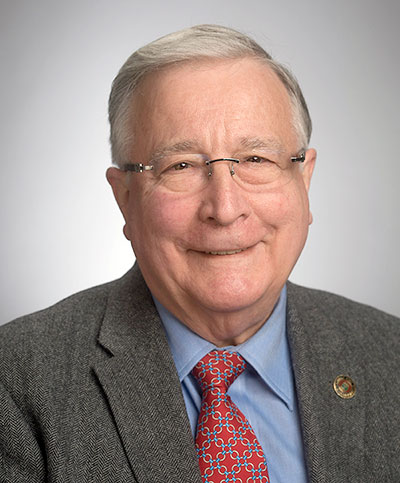 Ferdinand Urthaler, M.D., earned his medical degree at Switzerland’s University of Zurich and had planned to spend his career there after a brief research project in Birmingham.
Ferdinand Urthaler, M.D., earned his medical degree at Switzerland’s University of Zurich and had planned to spend his career there after a brief research project in Birmingham.
“I came here for two years,” he said, “and stayed a little longer.”
Urthaler, cardiologist and professor of medicine, physiology and biophysics, is one of three being honored for 45 years of service during UAB’s annual Service Awards Luncheon March 4, along with Jeanne Hutchison, Ph.D., assistant professor of mathematics, and Louis Dale, Ph.D., recently retired vice president for Equity and Diversity.
The university was still in its infancy when a young Urthaler, searching for a niche cardiac research opportunity, wrote a letter to Thomas James, M.D., at Henry Ford Hospital in Detroit. His reply came in a letter from Birmingham, where James had joined the faculty at UAB.
“Birmingham? I had only heard of it in (Martin Luther King Jr.’s) letter from the jail, and that was not encouraging,” he said.
As fate would have it, his Zurich department chair — a friend of John Kirklin — told him the renowned heart surgeon recently had left the Mayo Clinic to come to UAB, so Urthaler thought “there must be something there.”
In March 1970, the young doctor, married with two children, arrived for a two-year commitment.
How did that turn into nearly five decades?
“I was promoted,” Urthaler said. “Every time I thought about leaving I was promoted. And by then I noticed here I could do what I wanted. In Switzerland everything was so structured. Immovable. Inert. Bound by tradition. Not here in Birmingham. There was no tradition to push around. That is the major reason I stayed.”
In doing so, he came to know every president personally and became a part of the university’s history and traditions, even the less academic ones, like a prank by the late James Pittman Jr., former dean and principal architect of UAB’s School of Medicine from 1973 to 1992.
“I flew with James Pittman,” Urthaler said. “He loved to take people up in his bi-plane and climb straight up until the engine stalled and let the plane fall until you got green.”
| A list of all employees with 20 or more years of service being honored is online. |
Changing the fabric
The modern UAB campus is rich in international diversity, with students and faculty that represent nearly 100 countries. But when Urthaler, a native of the French-speaking city of Delémont, Switzerland, arrived that was not the case. “In those days, for example, there were no Chinese or Indian researchers in the labs. Or women,” he said. “Today there are probably none without them.”
Adjusting to life in the American South did not present any particular challenge “because I worked day and night to get my career going,” he said. But he did cite one cultural difference he learned when asked to explain overtime pay for lab assistants in his first months here: “I didn’t know Americans didn’t work on Saturday. Because in Switzerland, we did.”
Looking forward
From 1970 to 1994, Urthaler was primarily focused on NIH-funded research examining the causes of sudden cardiac death. Then, he said, he diversified beyond academic pursuits to clinical interests and became longtime chair of the university’s Institutional Review Board, which approves all research involving human subjects conducted by faculty, staff, and students.
Asked if he had ever had second thoughts along the way about the choice he had made to remain at UAB as it wrestled to rise to prominence, he said he did not.
“The vision people had was incredible,” Urthaler said. “I most remember looking forward — to see what it will be.”
Yet his advice to those in the early stages of their careers is also to ground their future in knowledge of the past.
“The United States is a young, dynamic country that looks forward,” Urthaler said. “But it is history — roots — that make an institution great. It is important to spend some time figuring out where one comes from.”
It’s likely he’ll be around to answer any questions you may have about that.
“Retirement is not a word I am familiar with,” he said.
